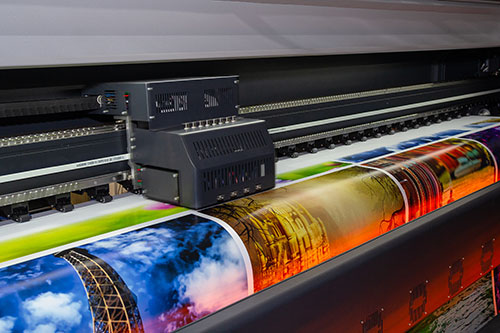A Comprehensive Guide to Recognizing Litho Printing Techniques
The world of litho printing, a method originating from the late 18th century, is a remarkable blend of background, art, advancement and scientific research. Remain with us as we journey right into the exciting world of litho printing.
The Historical Evolution of Litho Printing
The historic trajectory of litho printing, a pivotal innovation in the realm of interaction, is a fascinating tale of human resourcefulness. Birthed in the late 18th century by Alois Senefelder, this technique was at first a cost-effective approach of releasing theatrical works. Lithography, originated from the Greek words for 'stone' and 'to write', made use of a smooth stone surface to transfer photos onto paper. The process progressed with the arrival of the rotating press, which greatly enhanced performance (litho printing). In the 20th century, the development of offset lithography reinvented the industry, permitting mass production of premium prints. Each phase of litho printing's evolution showcases humankind's relentless pursuit of performance and quality in visual communication.
Translating the Scientific Research Behind Litho Printing Inks
Moving on in the expedition of litho printing strategies, the focus currently shifts to the scientific research behind litho printing inks. The structure of these inks, their drying process, and color mixing strategies develop the backbone of this complex art type. Understanding these aspects is essential to grasping the craft and attaining the wanted print results.
Make-up of Litho Inks
In lithographic printing, the fundamental duty of litho inks can not be overemphasized. The composition of litho inks differs depending on its purpose, but typically, they include two primary elements - pigments and cars. Pigments, the color-providing components, are finely ground fragments suspended in the car, a liquid that brings the pigment onto the printing surface. The lorry is a complex blend of materials, solvents, and oils, which influence the ink's drying time, attachment, and gloss. In addition, numerous additives are present to boost particular properties like flow, drying out, and resistance to environmental effects. Each part plays a vital part in the final print's high quality, making the precise solution of litho inks an intricate science.
Ink Drying Refine
From the make-up of litho inks, attention transforms to the remarkable procedure of ink drying. Two primary approaches are utilized in litho printing: oxidative drying and absorption. Absorption, on the various other hand, involves the ink permeating right into the paper fibers, which is a much faster process but can lead to much less dynamic shades.
Color Combining Methods
While the drying procedure plays a vital duty in litho printing, the scientific research of shade mixing methods holds equivalent importance. This is a complicated process that involves the careful blending of primaries: cyan, magenta, visit this site and yellow, in varying percentages to attain a vast selection of shades. The addition of black ink, called 'key', helps in regulating the strength and depth of the colors. The scientific research behind litho printing inks likewise thinks about the openness of the ink, which impacts how shades overlay and mix. To accomplish an efficient color mix, print experts need to also understand the details of ink habits, shade theory, and the physical properties of the substratum on which the ink is used.
The Art and Design Aspects in Litho Printing
Litho printing takes a breath life into art and layout via its special components. Litho printing suits a selection of shades, enabling artists to develop dynamic and vibrant prints. This combination of accuracy and flexibility makes litho printing a recommended selection for many musicians and developers.
Modern Applications of Litho Printing Methods
Litho printing techniques have actually discovered comprehensive use in the modern commercial sector. Its impact and relevance proceed to expand with the advent of brand-new innovations and modern technologies in the area. This area will discover these contemporary applications and the transformative role they play in the printing industry.
Business Litho Printing Utilizes
Litho printing stays an important component of the commercial market. High-volume printing tasks, such as the manufacturing of publications, papers, and packaging, rely on litho printing for its ability to supply remarkable photo quality and cost performance. Litho printing likewise provides a broad shade spectrum, exceptional to that of electronic printing.
Innovations in Litho Printing
Pressing the limits of standard methods, modern developments have fueled a host of innovations in litho printing. One prominent growth is digital litho printing, which combines the merits of electronic innovation with litho's top notch output. These innovations emphasize the long-lasting significance of litho printing in the contemporary globe.
Exploring the Process of Litho Printing: Detailed

Difficulties and Solutions in Contemporary Litho Printing

Regardless of the accuracy and practice that litho printing proudly promotes, it is not without its collection of contemporary obstacles. The most prevalent problems consist of the high preliminary configuration expense, trouble in printing variable data, and ecological concerns as a result of chemical usage. Options are emerging as innovation evolves. Digital litho printing permits affordable brief runs and simple customization, resolving the issue of variable data. Environmentally-friendly inks and much safer plate-making processes mitigate environmental problems. Furthermore, advancements in automation have actually decreased labor prices, further democratizing reference the lithography process. Therefore, while there are challenges, the litho printing sector is proactively adapting to fulfill them head-on, guaranteeing its significance in the future.
Conclusion
In final thought, litho printing, with its abundant background and scientific complexities, holds a considerable place in the print sector. The future of litho printing pivots on its capacity to adapt to these altering demands, attesting its enduring worth in a developing market.
